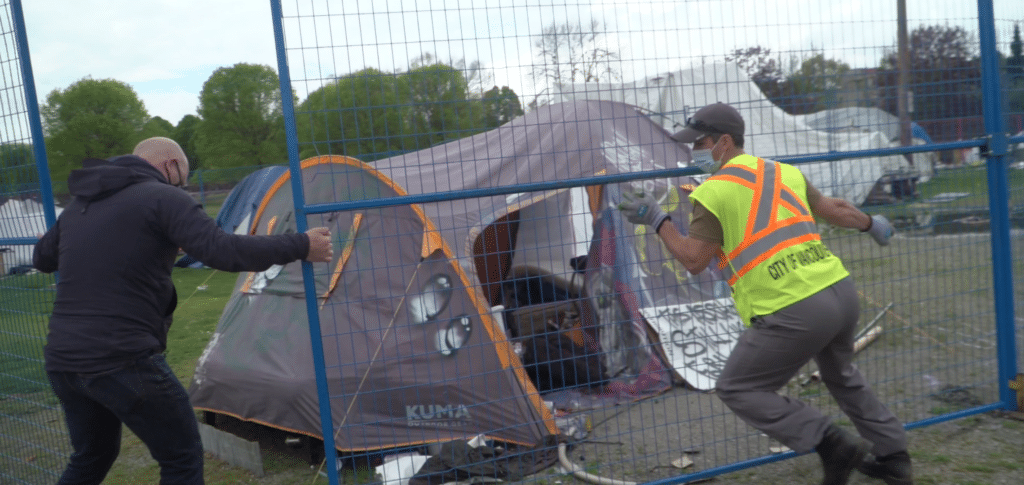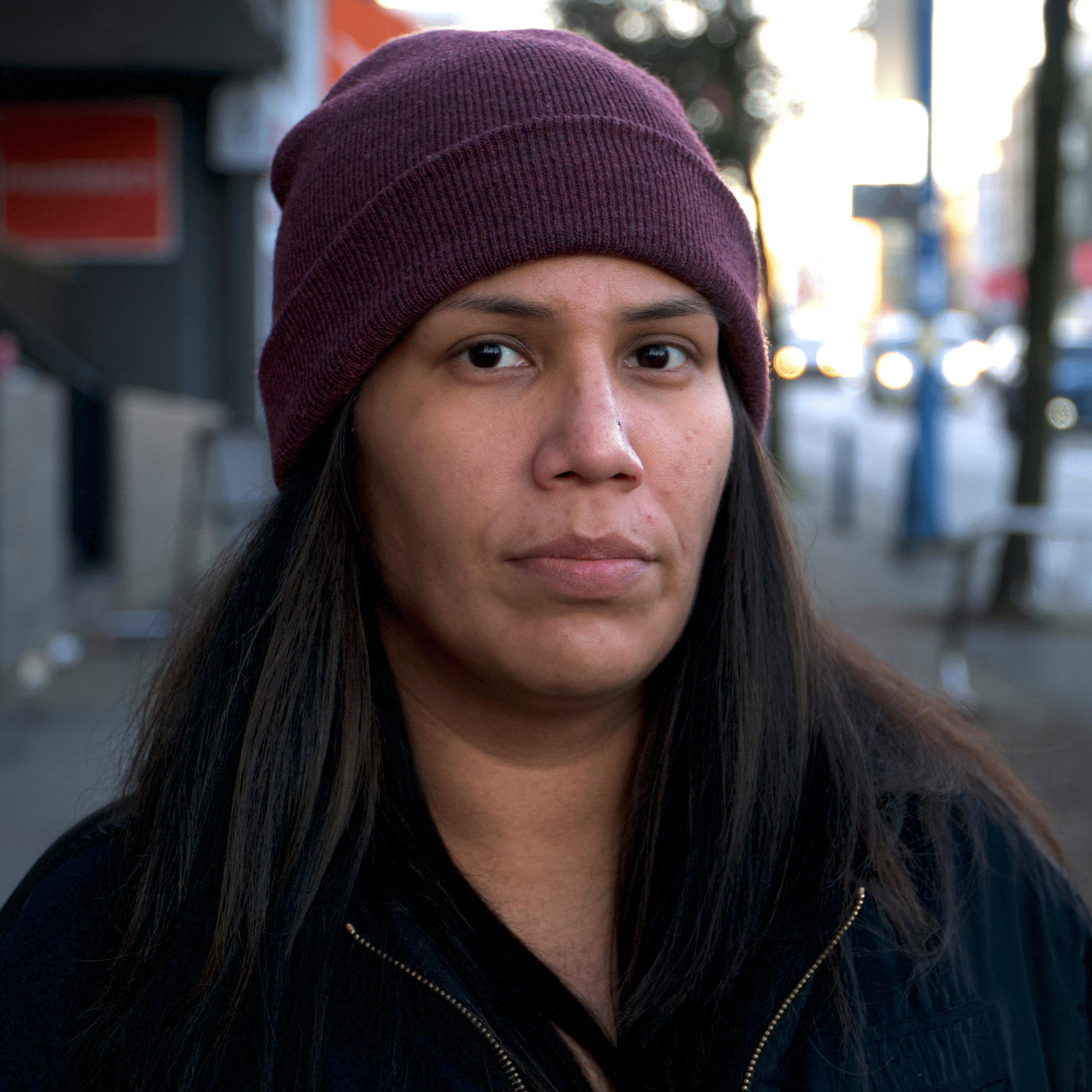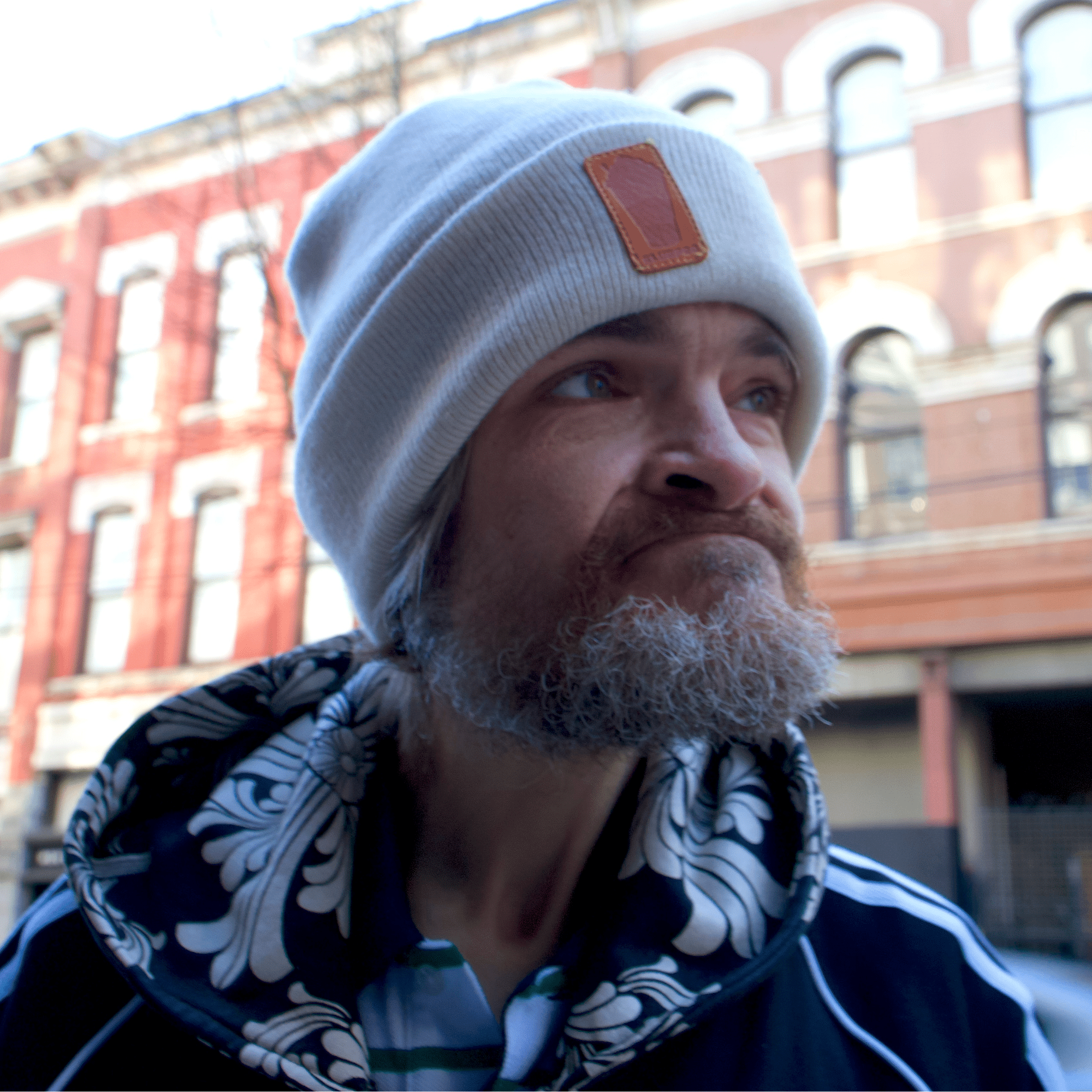We’re Taking the City to Court!
On January 30, 2025, BCCLA alongside, Zee, Jason, and Brittany, filed a lawsuit against the City of Vancouver to challenge a number of Vancouver Bylaws that make it illegal for unhoused people to shelter outdoors during daytime hours. This ban is cruel, dehumanizing, and deadly. It violates sections 7, 12, and 15 of the Charter of Rights and Freedoms.
Nowhere to Stay, Nowhere to Go
Daytime sheltering occurs when people shelter in public space because there is no adequate alternative shelter available.
In 2009, BCCLA intervened in Victoria v Adams, when the groundbreaking decision by the BC Court of Appeal established the right to shelter outdoors. When there is a lack of adequate alternative shelter, the Charter guarantees the right for people to protect themselves from the elements in public spaces, at least overnight. But the law so far continues to leave people vulnerable during the day.
The number of unhoused people in Metro Vancouver is at an all-time high. The real numbers far exceed the 2023 bare minimum count of 4,821, with approximately half – 2,420 – within the City of Vancouver. Yet there are only 1,400 shelter beds in the city, and they often have restrictions making them inaccessible to people. It means that every day, thousands of unhoused people have no accessible shelter.
However, the City’s bylaws currently prevent unhoused people from sheltering in public spaces from 8am to dusk. This means that by 8am, the City of Vancouver expects people to completely pack up their homes and all of their belongings, regardless of their health or the weather.

Zee
“Imagine just being alive and everywhere you go, every moment of the day, you are getting a very clear message that there’s no space you can exist in. You will have the police called for literally sitting on a step or putting your bag down for a minute because you’re so physically exhausted you can’t carry it, or for having a mobility aid that you need to keep with you. It would wear anybody down.”
With nowhere to stay and nowhere to go, people are forced to carry their entire homes [their entire lives] and keep moving. For people with disabilities, it is simply impossible to set up and take down their shelter day in, day out, and then carry all of the things they need for their survival around with them throughout the day. The physical and mental impacts of being routinely, consistently, and violently displaced are profound.
The City’s approach to daytime sheltering is costly, ineffective, and inhumane.
Enforcing the ban on daytime sheltering and trapping people in a pointless cycle of violent displacement is a waste of public resources. Unhoused people deserve to have their government treat them with dignity and respect. Instead, the City enforces bans on daytime sheltering with callous cruelty by forcing people to either carry their belongings around all day or be violently decamped if they try to shelter.
People who are daytime sheltering are routinely subjected to constant harassment, surveillance and violence by state actors (including City workers, Park Rangers, and the Vancouver Police Department). Police often seize everything from essential medications and mobility aids to irreplaceable family photos.

Brittany
“I went to the hospital for 3 days when I gave birth to my son. When I came back to my designated spot in CRAB park to pick up the things I had collected for him – baby clothes, a breast pump – the rangers said that because I was in the hospital, I was housed, and they took everything. I didn’t have anything for my son at all. That was hard. To come back and everything was gone when I had saved it for months.”
What sections of the Charter do the bylaws violate?
An absolute ban on daytime sheltering in Vancouver puts the safety, security, and very survival of our unhoused community at risk, in violation of their rights under section 7 of the Charter to life, liberty and security.
Section 12 of the Charter protects against cruel treatment by the state. When a city steals someone’s tools for survival, leaving them to suffer without protection against the elements, the cruelty speaks for itself.
Finally, we’re also challenging these laws as a violation of equality rights under section 15 of the Charter. For many people with mental and physical disabilities, it is simply impossible to set up and take down their shelter every day, and then carry it all around with them wherever they go. What’s more, women and gender diverse people are made more vulnerable to dangers like gender-based violence when subjected to a daytime sheltering ban.
Shelter is Stability
Shelter is a fundamental human right. It’s essential for survival, health, dignity, and foundational to the exercise of all other human rights and civil liberties. Giving people the right to daytime shelter gives people the stability they need to move forward with their lives.

Jason
“Getting the right to shelter during the day would make a huge difference. It would be the first step in getting your dignity back…to getting your life back. Once we can legally shelter outside during the day, the City will be forced to find a solution. It’ll encourage the government to take some positive action. We have to find a better way.”
The City of Vancouver must be held accountable
When it comes to housing in this city, the government is failing all of us, but no one feels this failure more than people who are unhoused. Instead of continuing to violate the rights of their constituents, our government needs to allocate public resources towards working with unhoused people to find real solutions.
Jason’s Story
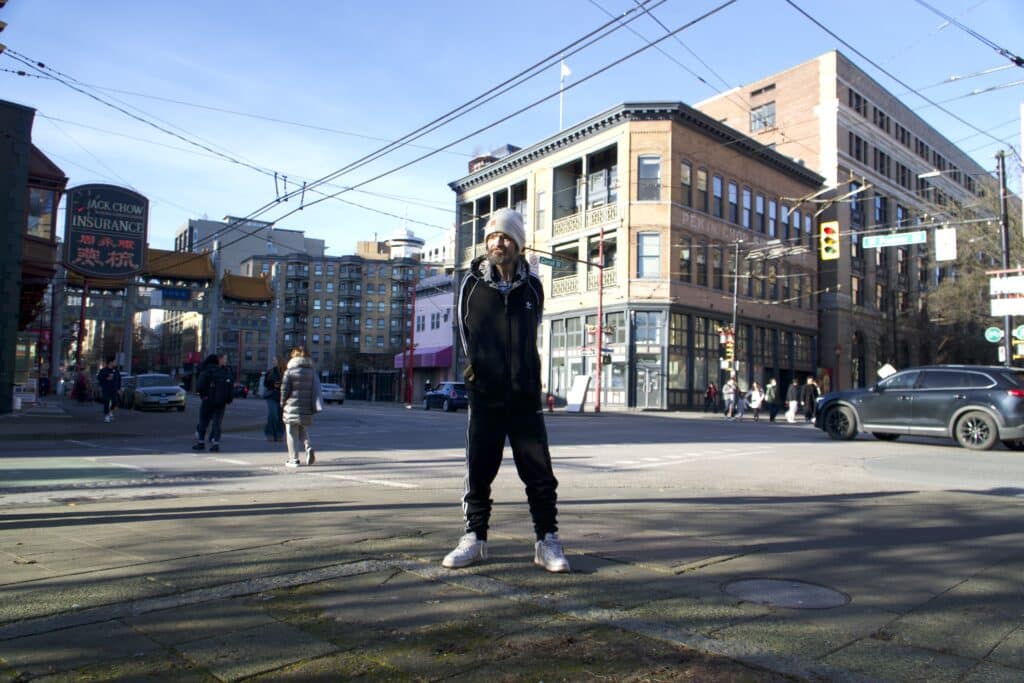
I’ve been standing up for my rights and the rights of my neighbours in the Downtown Eastside for over 5 years now. I’m a plaintiff in this case because I want my friends and neighbours to have stronger legal ground to stand on when the police try to tear down their makeshift homes and violate their Charter rights. Getting the right to shelter during the day would make a huge difference. It would be the first step in getting your dignity back…to getting your life back. Once we can legally shelter outside during the day, the City will be forced to find a solution. It’ll encourage the government to take some positive action. We have to find a better way.
Read Jason’s full story
I’ve been standing up for my rights and the rights of my neighbours in the Downtown Eastside for over 5 years now. I’m a plaintiff in this case because I want my friends and neighbours to have stronger legal ground to stand on when the police try to tear down their makeshift homes and violate their Charter rights.
Years ago, I lived in a Single Room Occupancy (SRO) unit but the condition of the space was terrible, almost a slum. I decided to try staying outdoors for 1 or 2 nights a week to get away and realized that I was more comfortable living in a tent on the street than in the space I had.
I lived on the streets for 5 years. I found a community and made friends. There was safety in numbers – your stuff was less likely to get stolen and you were less likely to be targeted by the police if there were witnesses.
Everytime someone’s home and stuff gets taken by the City, it turns their life upside down. Imagine someone coming into your house, attacking you, taking your stuff, then destroying your house, and saying “have a nice day”. That’s how it feels. I don’t want people to worry about their makeshift housing when they have so much to worry about already.
Your average person doesn’t want me moving into their neighbourhood because I got kicked off of Hastings; they want me off the street period, they want me in a house. That’s the solution that people want; the city’s solution is to spread us out and hope that we become less visible.
I was on a housing list the entire time, but the building was under renovation. It took forever to rebuild it. It took so long I started to wonder: was I even really on a list?
But look at me: I went from living on the streets to having my own place. It can happen to anyone. I did it my way, not the city’s way. We should have the choice about how we solve our own problems.
Getting the right to shelter during the day would make a huge difference. It would be the first step in getting your dignity back…to getting your life back. Once we can legally shelter outside during the day, the City will be forced to find a solution. It’ll encourage the government to take some positive action. We have to find a better way.
Zee’s Story
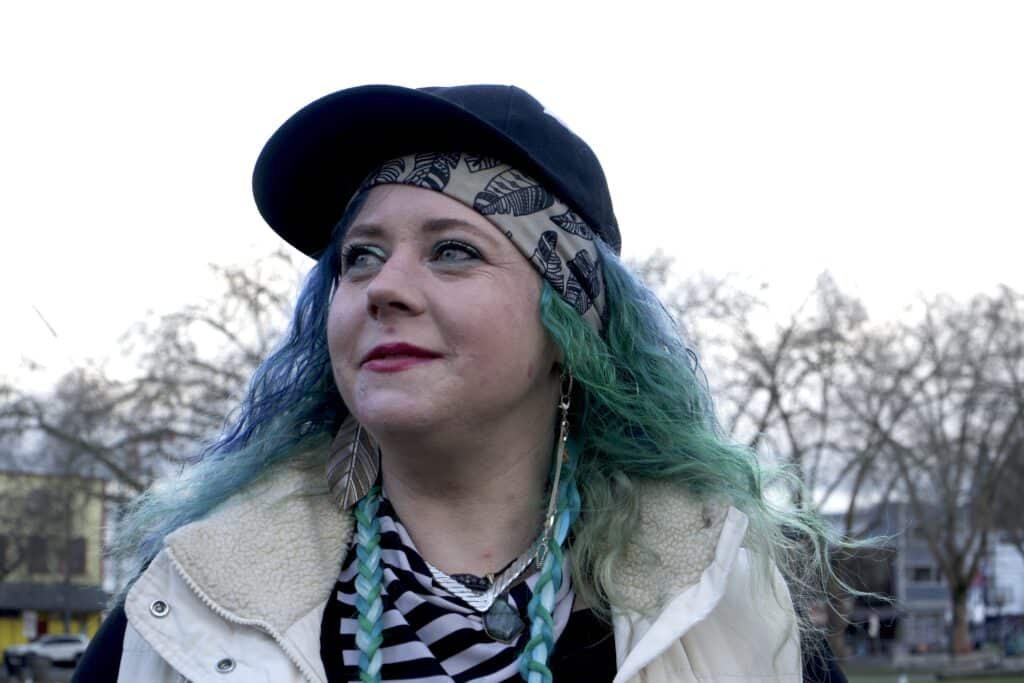
I was born in Vancouver and spent a lot of my formative years in the Downtown Eastside. I care deeply about this place. If you want to keep people trapped in poverty, the City is doing a great job. Decampments are a waste of resources. They’re inhumane and cruel and just make no sense. These bylaws kill people. I’m witness to the unnecessary suffering down here and am not going to be silent. I’m doing this legal case to prevent unnecessary harm. This loss of life is preventable. We are here to hold the City to account. I am proud to be involved with this legal case and speak for myself and others who have been silenced.
Read Zee’s full story
I was born in Vancouver and spent a lot of my formative years in the Downtown Eastside. I care deeply about this place. I lost my housing when the City illegally evicted myself and my four roommates so that developers could demolish the houses and build expensive condos. We were demo-victed. We should have been rehoused and had our moving expenses covered, but none of that happened.
At the time, I was recovering from a second workplace injury to my back (that ended up being a life-long disability). I had protected a student from a fatal accident and was learning how to walk again. I didn’t have anywhere near the income to afford rents that had massively increased after the pandemic, and I had already been paying near enough to 75-80% of my working income on rent.
It was early August last year when I didn’t have anywhere else to go. I built a small shelter to keep me safe at Oppenheimer Park. There was good community there – people looked out for each other. There were times of being hungry but there was usually some food coming through the park daily. The weather made it really hard. I have an autoimmune disease that makes me more high risk so I was really struggling with ongoing health issues. It was hard and stressful staying dry and clean, and challenging to maintain things like my mobility aid (my bike).
The sweeps were happening daily. Because of the daytime sheltering bylaw, I would be forced out of my tent each morning regardless of my health or if I was even capable. No accommodations or considerations for my health were made. There were days where I would wake up in pain, cold, and immobile and I would have the City drop my tent down on top of me. Once, I was surrounded by ten park rangers and ten police, mostly male. They circled around me and took my belongings over 45 minutes, including my boots, my rain gear, my tarps – in the middle of winter – anything I had to keep myself safe and mobile they went for. Nothing was ever returned to me. I would love to say it didn’t break me, but it definitely broke me down. It felt like it just wasn’t a survivable situation.
Imagine just being alive and everywhere you go, every moment of the day, you are getting a very clear message that there’s no space you can exist in. You will have the police called for literally sitting on a step or putting your bag down for a minute because you’re so physically exhausted you can’t carry it, or for having a mobility aid that you need to keep with you. It would wear anybody down.
The City sweeps make survival feel impossible – they disempower and dehumanize us and put us at extreme risk. I want to get back to my life. I want to be able to contribute and grow, to complete my education and get back to working in healthcare and education. I have the will but I don’t currently have the way.
If you want to keep people trapped in poverty, the City is doing a great job. Decampments are a waste of resources. They’re inhumane and cruel and just make no sense. These bylaws kill people. I’m witness to the unnecessary suffering down here and am not going to be silent. I’m doing this legal case to prevent unnecessary harm. This loss of life is preventable. We are here to hold the City to account. I am proud to be involved with this legal case and speak for myself and others who have been silenced.
Brittany’s Story
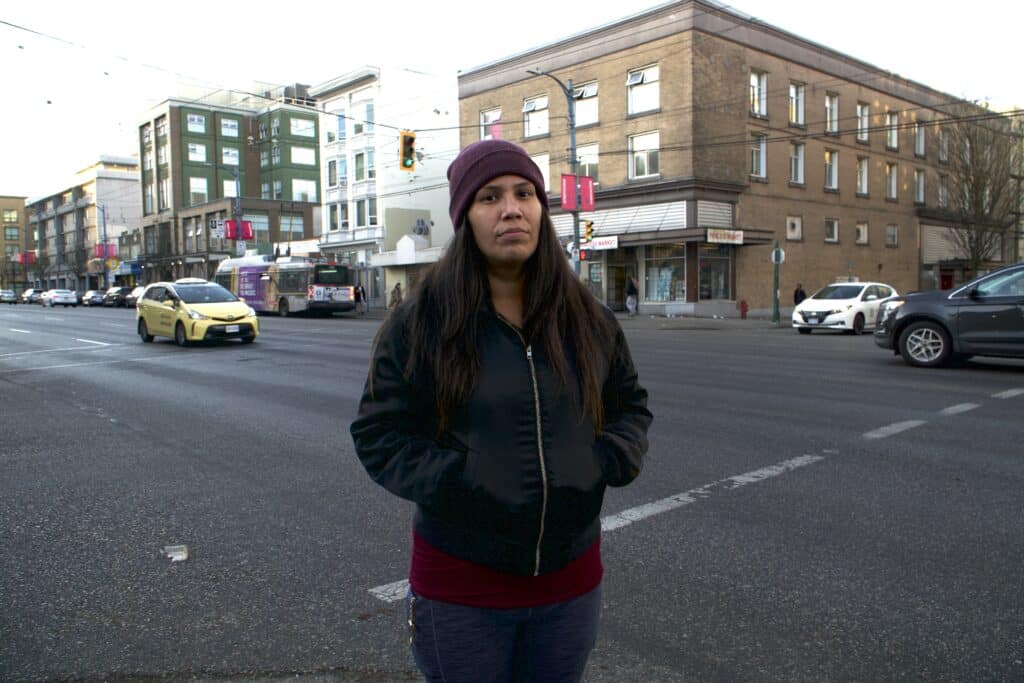
I was at CRAB park for 3 and half years. It wasn’t perfect but I became part of a community there. Everybody worked together to keep it moving – people came to ask for help, stay for a week, and then move on. People who had nowhere to go, had somewhere to go until they could get housing. I hope that this case gives us the right to shelter during the day. I showed kindness in a place where people didn’t expect it anymore and it went a long way. We made a community come together and to me that’s a huge thing.
Read Brittany’s full story
“I was at CRAB park for 3 and half years. It wasn’t perfect but I became part of a community there. When I was there and I was pregnant, the cook used to wake up every morning just to make sure I had something in my stomach. Nobody had to look after me, but people would check on me to see if I was ok.
Everybody worked together to keep it moving – people came to ask for help, stay for a week, and then move on. People who had nowhere to go, had somewhere to go until they could get housing.
To me, an SRO is unlivable compared to a tent. SROs have black mould, cockroaches, and everyone gets sick. The only time I’ve ever had head lice was in an SRO.
They don’t have daytime sheltering anywhere now. You have to take your tent down at 8am in the morning and if you don’t, they take your stuff and throw it away. Because of this, we have to stay outside with all of our belongings all day. There’s no difference between a tent and a home, except for us, we have to take ours down and move it around for 10 hours every day.
They take tents, clothes, everyday use stuff like backpacks, hygiene stuff – things that are replaceable but that are tedious or hard to keep having to go get it over and over again. Especially being on welfare or disability – you don’t have money to go and buy things over and over and over again. It makes it super hard to be able to go on to the next day.
I went to the hospital for 3 days when I gave birth to my son. When I came back to my designated spot in CRAB park to pick up the things I had collected for him – baby clothes, a breast pump – the rangers said that because I was in the hospital, I was housed, and they took everything. I didn’t have anything for my son at all. That was hard. To come back and everything was gone when I had saved it for months.
I’ve seen park rangers and police stand there and laugh about taking people’s stuff and throwing it in the garbage. They don’t care.
I hope that this case gives us the right to shelter during the day. I showed kindness in a place where people didn’t expect it anymore and it went a long way. We made a community come together and to me that’s a huge thing. I never got the help when I needed it and I don’t want anyone else to feel that aloneness.”

